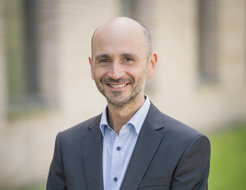Nicola Iovino appointed as Director of the MPI in Freiburg
Research to understand epigenetics’ role in evolution and development
The Max Planck Society is pleased to announce the appointment of Dr. Nicola Iovino as the new Director of the Max Planck Institute of Immunobiology and Epigenetics (MPI-IE) in Freiburg. He will join the Management Board of the Institute and continue his research in the newly established Department of Developmental Epigenetics.

Nicola Iovino is a distinguished leader in the field of epigenetic inheritance. The Iovino group has made significant contributions, most notably demonstrating that parents transmit not only genetic but also epigenetic information to their offspring in the form of histone post-translational modifications. Histones are small proteins that help cells organizing their chromosomes in the nuclei. Beyond their structural role, histones can be modified in different ways, such as the addition of methyl or acetyl groups.
These modifications can activate or deactivate genes in specific cell types, tissue, or developmental windows. The Iovino group revealed that these modifications can be deposited by the mother into the embryo, highlighting an entirely unanticipated maternal role in controlling the fate of the offspring.
Epigenetic Inheritance Across Generations
»Epigenetic inheritance« has the potential to drive biological diversity and evolution. Contrary to the long-held belief that epigenetic information is erased during gamete formation, a growing evidence suggests that some epigenetic marks can be transferred across generations and control the first steps of the developing embryo.
Nicola Iovino’s laboratory has pioneered the field, demonstrating that two distinct epigenetic modifications, H3K27me3 (in 2017) and H3K9me3 (in 2024), are passed from the maternal germline to the next generation. These inherited modifications are crucial to set the stage for proper embryonic development as they regulate gene expression during embryonic genome activation. While initial studies were conducted in the fruit fly Drosophila melanogaster, a well-established invertebrate model system, the role of epigenetic inheritance appears conserved across a wide range of animal species including worms, mice, and fish and spanning millions of years of evolution. “My objective is to unravel the impact of epigenetics on biological diversity and evolution by elucidating its influence on the expression of genes responsible for adaptive responses to environmental stimuli. I believe our findings will help shed light on novel principles underlying epigenetic inheritance,” says Nicola Iovino.
CV
Nicola Iovino studied Biology at the University of Federico II in Naples, Italy. He completed his PhD at the Rockefeller University in New York, USA, and the University of La Sapienza in Rome, Italy. Subsequently, he pursued postdoctoral research with Giacomo Cavalli at the Institute of Human Genetics (IGH-CNRS) in Montpellier, France. In 2014, Nicola Iovino established his independent research group, “Chromatin Regulation in Early Embryo”, at the Max Planck Institute of Immunobiology and Epigenetics in Freiburg. Since then, he and his lab have become pioneers in the field of epigenetic inheritance. His significant scientific contributions have been recognized by his selection as an EMBO Young Investigator in 2017 and the award of a prestigious European Research Council (ERC) Consolidator Grant in 2018. In 2024, Nicola Iovino was appointed as an Director at the Max Planck Institute of Immunobiology and Epigenetics in Freiburg (Germany) – leading the Department of Developmental Epigenetics.







